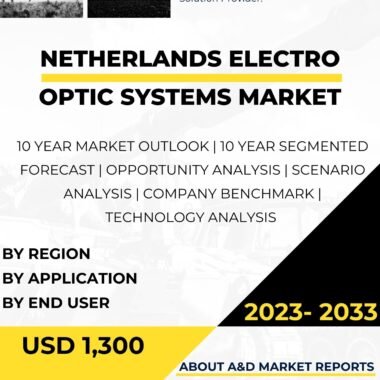Description
The Brazil Electro Optic Systems Market has become a vital component in the country’s quest for advanced defense technologies and modernization of its armed forces. Electro-optic systems encompass a wide range of technologies that utilize light and electro-optical devices for various military applications. These systems provide enhanced surveillance, target acquisition, and tracking capabilities, enabling defense personnel to operate effectively in diverse operational environments. As Brazil faces evolving security challenges and seeks to enhance its defense capabilities, the market for electro-optic systems has gained momentum. This article provides a comprehensive analysis of the Brazil Electro Optic Systems Market, covering its current state, key drivers, challenges, applications, technological advancements, and growth prospects.
The Brazil Electro Optic Systems Market has witnessed remarkable growth as the country prioritizes the acquisition of advanced defense technologies. Electro-optic systems offer versatile and high-performance solutions for defense applications, making them indispensable tools for Brazil’s armed forces. One of the key drivers behind the market’s growth is the growing need for enhanced surveillance and situational awareness. Electro-optic systems, such as thermal imaging cameras and night vision devices, provide defense personnel with the ability to operate effectively in low-light or obscured environments. The improved visibility and target identification capabilities of these systems contribute to better mission success rates and reduced operational risks.
Another significant driver is the increasing importance of intelligence gathering and target acquisition capabilities. Electro-optic sensors, such as high-resolution cameras and laser rangefinders, enable defense forces to gather valuable intelligence, monitor critical areas, and accurately identify and track potential threats. The ability to acquire and process real-time data enhances decision-making processes, enabling more timely and informed responses to emerging situations.
Technological advancements have played a pivotal role in shaping the Brazil Electro Optic Systems Market. The development of cutting-edge electro-optic technologies, including advanced sensors, imaging systems, and laser designators, has significantly enhanced the performance and capabilities of these systems. Miniaturization of components has also enabled the integration of electro-optic systems into various platforms, such as ground vehicles, aircraft, and naval vessels, expanding their applications and operational flexibility.
The market’s growth is further driven by Brazil’s efforts to strengthen its indigenous defense capabilities. The country seeks to reduce dependency on foreign suppliers and develop its electro-optic systems to enhance its self-reliance in the defense sector. By fostering domestic research and development and promoting collaborations with local industries, Brazil aims to develop cutting-edge electro-optic systems tailored to its specific defense requirements.
The Brazil Electro Optic Systems Market finds diverse applications across the defense sector, with various systems catering to different operational needs. One of the primary applications is reconnaissance and surveillance. Electro-optic sensors, such as EO/IR (Electro-Optical/Infrared) cameras, provide real-time video feeds and high-resolution imagery, allowing defense personnel to conduct effective surveillance over large areas and monitor activities in real-time.
Target acquisition is another crucial application of electro-optic systems. Laser rangefinders and target designators enable accurate identification and tracking of potential threats, facilitating precise engagement and minimizing collateral damage during military operations.
Electro-optic systems are also extensively used in navigation and guidance. Infrared and laser-based systems assist in guiding precision munitions and enabling accurate navigation in GPS-denied or contested environments.
Night vision devices are essential tools for defense personnel operating in low-light conditions. These devices provide enhanced visibility and situational awareness during nighttime operations, contributing to the safety and effectiveness of military missions.
Furthermore, electro-optic systems play a crucial role in maritime defense. Electro-optic sensors deployed on naval vessels enhance maritime surveillance, detect potential threats, and monitor critical sea lanes, thus bolstering Brazil’s maritime security.
Despite the market’s growth and potential, the Brazil Electro Optic Systems Market also faces certain challenges. One significant challenge is the complexity and cost associated with developing advanced electro-optic technologies. The research, development, and production of cutting-edge electro-optic systems require substantial investments in infrastructure, specialized expertise, and testing facilities.
Interoperability with existing defense systems and platforms is another challenge. Ensuring seamless integration and compatibility of electro-optic systems with various defense platforms, such as vehicles, aircraft, and ships, is crucial for efficient joint operations and mission success.
The regulatory and legal landscape surrounding electro-optic systems also presents challenges. Export controls and international agreements govern the transfer and use of certain technologies, including electro-optic systems. Compliance with these regulations while maximizing technological advancements poses complexities for defense planners.
Moreover, skilled personnel with expertise in electro-optic technologies are essential for the successful development, operation, and maintenance of these systems. Addressing the shortage of qualified professionals poses a challenge to the sustainable growth of the market.
Looking ahead, the Brazil Electro Optic Systems Market is poised for continued growth and advancement. As the country faces evolving security challenges and seeks to enhance its defense capabilities, the demand for advanced electro-optic systems will rise. Continued investment in research and development, technology transfer agreements with international partners, and the establishment of comprehensive testing and evaluation facilities will be essential to overcome the challenges associated with the development and deployment of electro-optic systems.
In conclusion, the Brazil Electro Optic Systems Market plays a crucial role in the country’s military modernization and pursuit of advanced defense technologies. These systems provide enhanced surveillance, target acquisition, and tracking capabilities, contributing to improved situational awareness and operational effectiveness. The market’s growth is driven by Brazil’s pursuit of indigenous defense capabilities, technological advancements, and the need to address emerging security threats. Addressing challenges related to technology development, interoperability, regulatory compliance, and skilled personnel will be key to unlocking the full potential of electro-optic systems in bolstering Brazil’s defense capabilities and national security.




